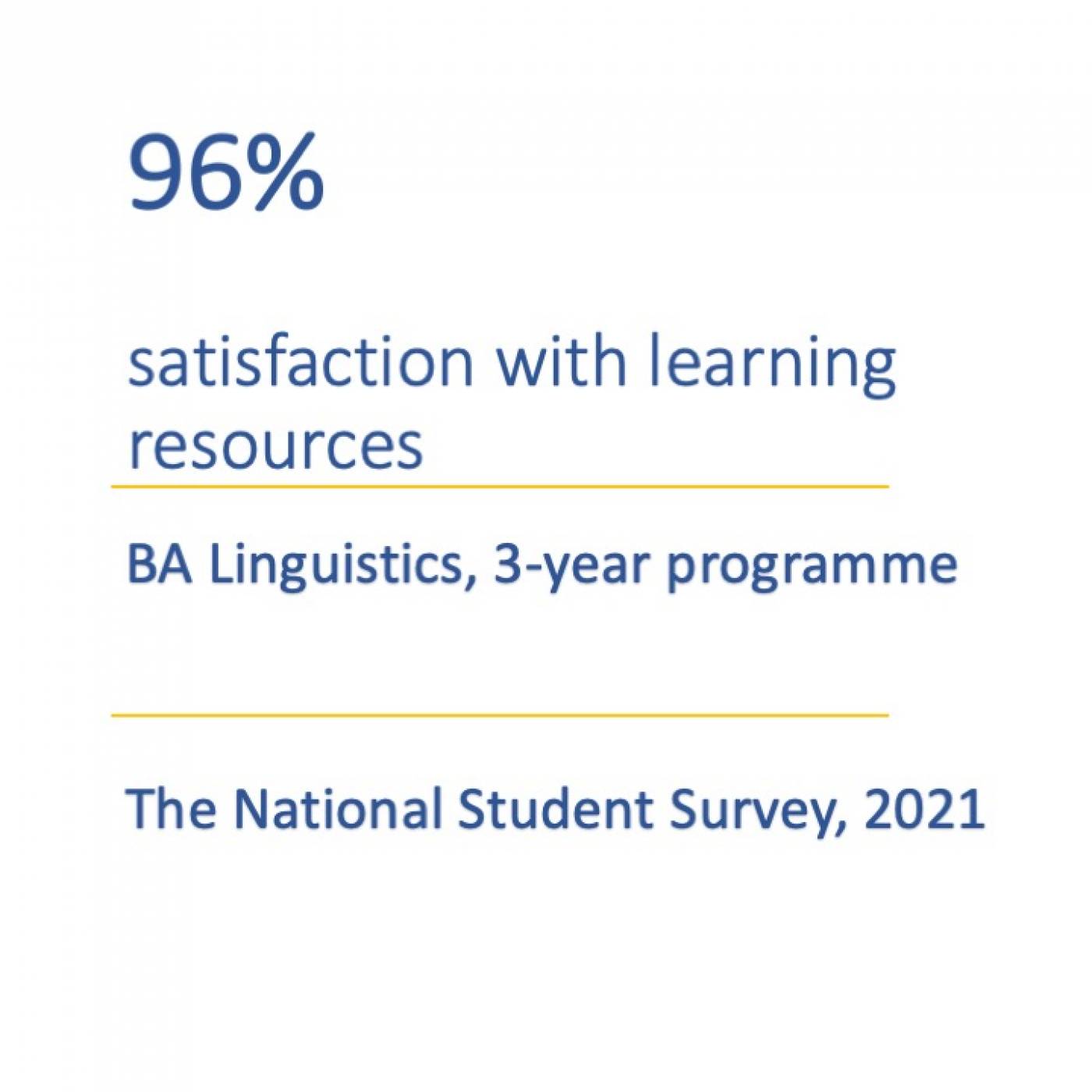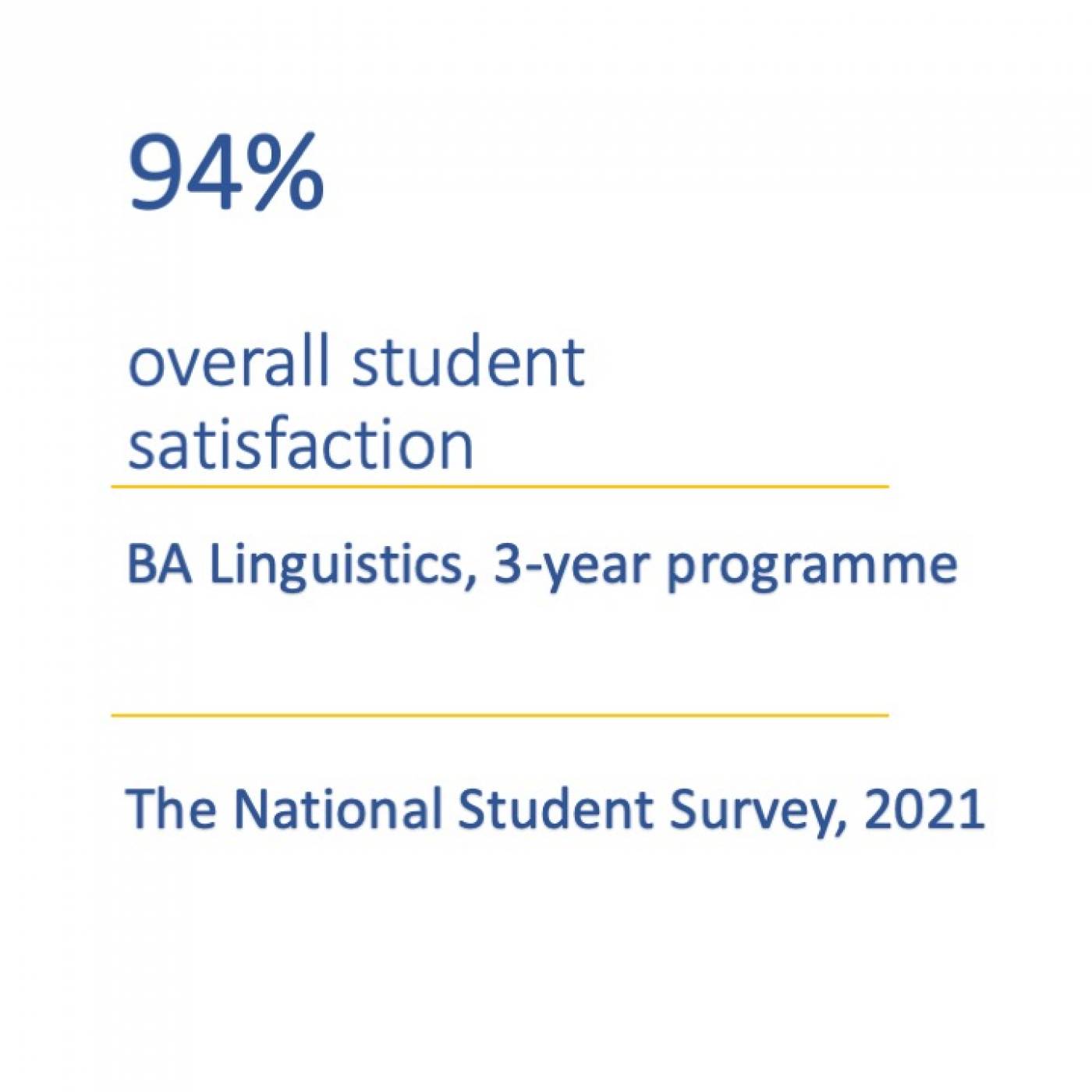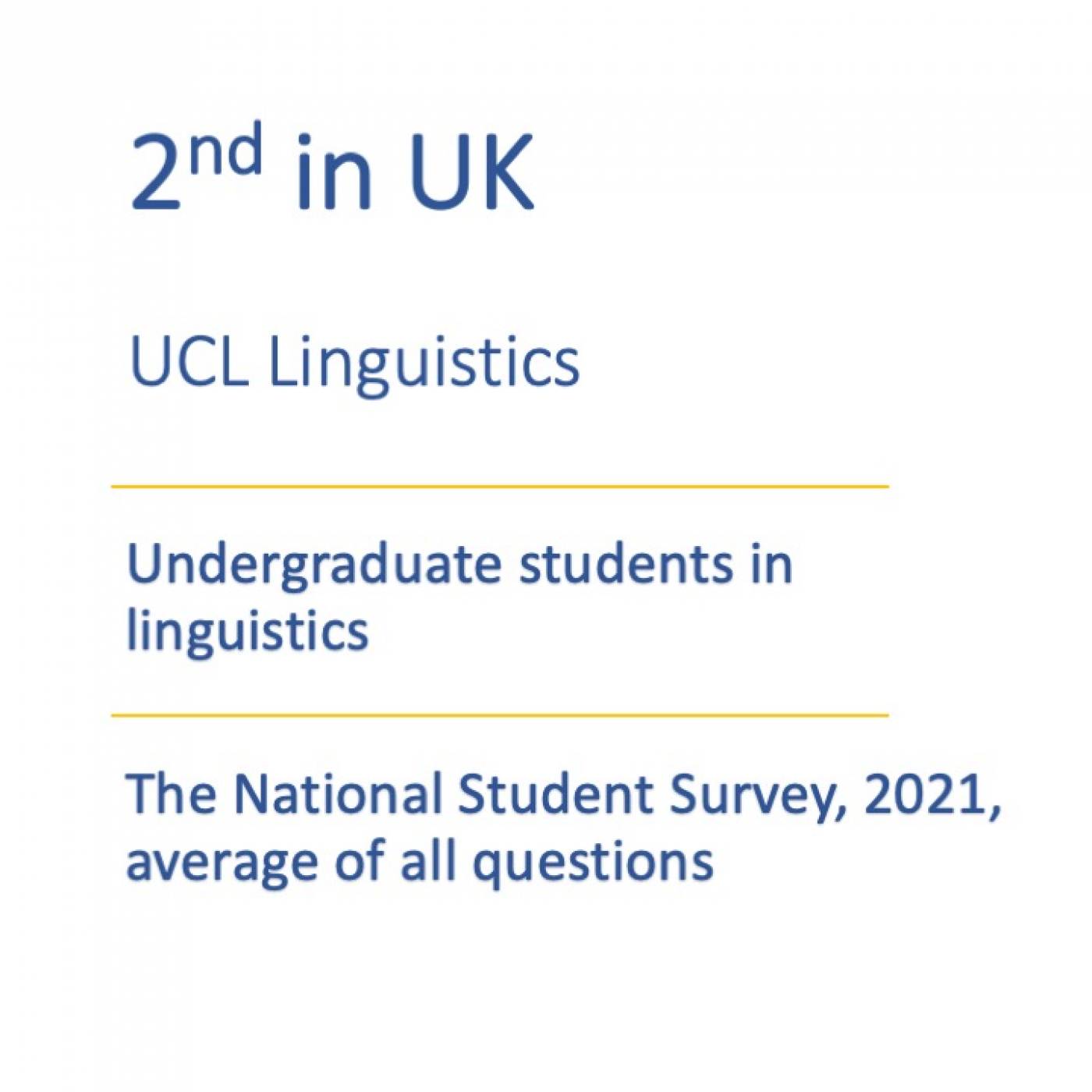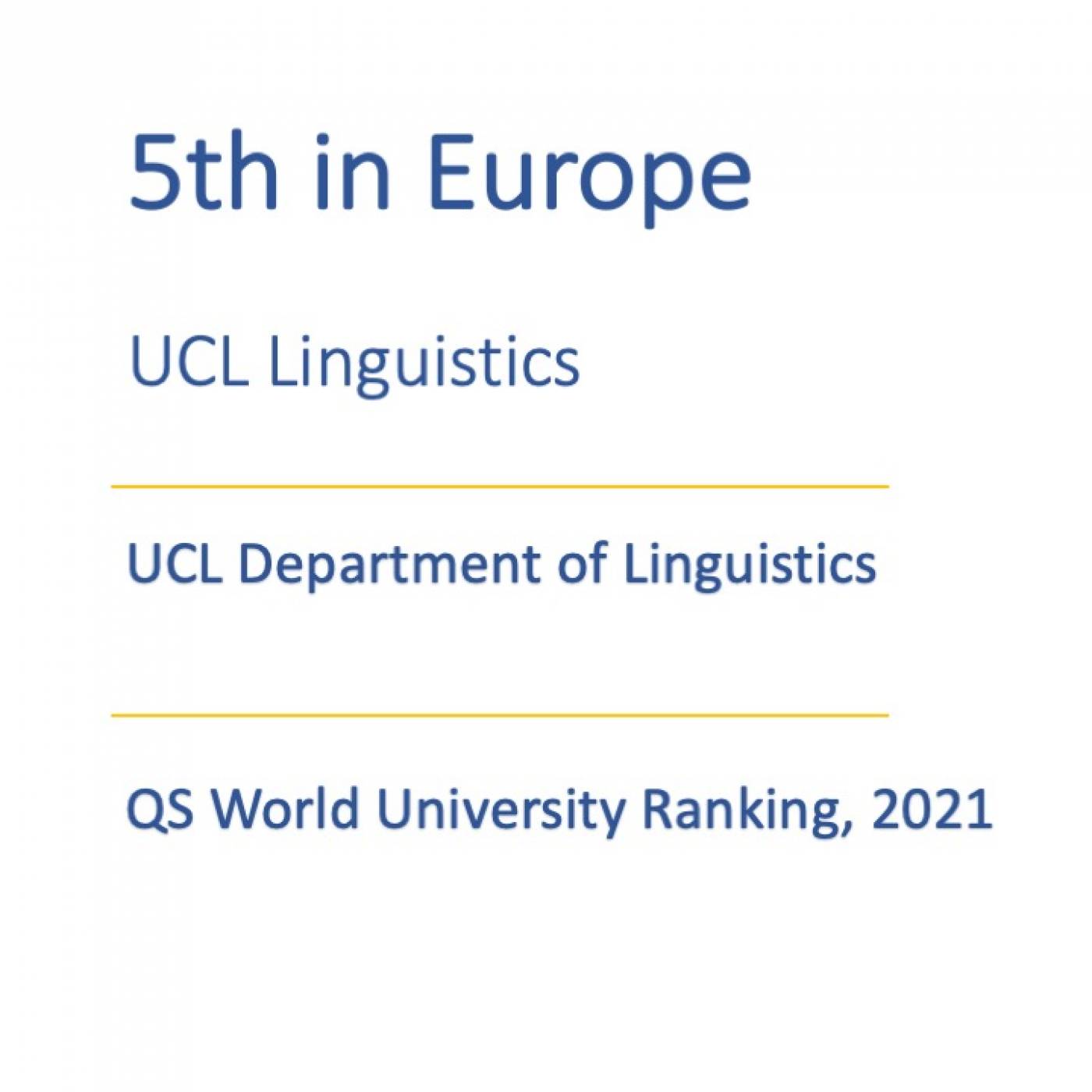UCAS Code: Q102 BSc Experimental Linguistics and Q103 BSc Experimental Linguistics (International Programme)
About linguistics
Linguistics is an interdisciplinary field dedicated to the systematic study of our uniquely human capacity for language. Linguists describe the dazzling variety of languages while at the same time searching for hidden commonalities between languages to uncover fundamental principles of the human mind.
To do this, linguists draw on a broad interdisciplinary toolset. They deploy field methods to find out more about the world's languages, methods from philosophy and logic to analyse meaning, ideas from sociology to understand the relation between language and identity, psychological and neuroscientific methods to study language processing mechanisms in real-time, and evolutionary biology to shed light on the origins of language. In recent years, there has been an increasing emphasis on methodological rigour and formal experimentation.
Indeed, the UCL Linguistics was instrumental in establishing the discipline of experimental pragmatics and the first to offer a degree devoted to experimental linguistics, the department has been very much at the forefront of these developments. The BSc Experimental Linguistics at UCL is very much characterized by a diversity of approaches and methods: you may one day be desiging stimuli for an artificial language learning experiment to shed light on theoretically derived ideas about universal grammar on one occasion, collect eye-tracking data to investigate real-time language processing on a second, and accoustically analyse recordings made in one of our sound proof booths on a third.
Linguistics at UCL
UCL Linguistics is a cutting-edge department ranked 5th in Europe the 2023 QS Ranking. You will find a welcoming home in Chandler House in Bloomsbury with access to libraries and research laboratories, where experiments in psycho-linguistics, neuro-linguistics, acoustics, as well as child language acquisition can be conducted. Experimental Linguistics BSc students benefit greatly from the department's close ties to the departments of Language & Cognition and of Speech, Hearing, & Phonetic Sciences as well as its location within the division of psychology and language sciences with staff specializing in experimental psychology, cognitive neuroscience, and the psychology of language.
The international programme is a four-year version of the BSc Experimental Linguistics. You will spend the third year abroad, allowing you to immerse yourself in a different culture, study linguistics from a different perspective at one of our partner institutions, and potentially perfect your mastery of a foreign language.
Prospects
A degree in experimental linguistics from UCL will equip you with a deep understanding of your own language as well as foreign languages, the ability to formulate concrete hypotheses about them and to design, run, and interpret experiments testing such hypotheses using a variety of methodologies. You will acquire sought after transferable skills for collecting a broad range of data experimentally, statistically analysing and presenting them; to write and speak cogently and with confidence about them; and for accessing and critically evaluating information. For this reason, the degree will open up a wide range of career options. Some - like teaching English as a foreign language or speech and language therapist, - require directly language-related skills and knowledge while others - data-scientist, tech-related careers in natural language processing, analyst - build more strongly on the analytic, quantitative, and argumentative skills the degree confers.
If you like to solve puzzles, find yourself marvelled by the complexity of human languages, and are looking for stimulating studies in a welcoming environment in central London's Bloomsbury, then we would be pleased to receive your application.
Linguistics
Linguistics at UCL
- Content
The first year of your degree is made up of mandatory courses taken by all students on the degree. These courses give you a broad foundation in linguistics and statistical methods. They cover the topics of the sound patterns of the languages of the world, the structure of words and sentences in selected languages, the interpretation of sentences and their use in conversation, as well as statistics and programming in R. In your linguistics courses, you will practice distinguishing and producing sounds, analyse and represent a variety of linguistic data, and develop your argumentative skills.
Half of the modules in year two are mandatory. In them, you learn about Psycho- and Neurolinguistics, how language develops in children, and you deepen your understanding of statistics. You can tailor three further modules to suit your interests in linguistics specifically. Finally, you have the opportunity to pursue connections between linguistics and psychology, neurology, or computer science, to mention but a few. Apart from knowledge of languages, linguistics, and experimental methods, the intense study of linguistics will develop your ability to understand and evaluate explanatory theories in any domain and develop your critical thinking skills.
If you enrol in the international programme, you will spend your third year studying abroad at one of our partner institutions, immersing yourself in a foreign culture, and possibly perfecting a foreign language.
During your final year you will design, organize and carry out your own research project under specialist supervision and take a lab module to gain skills in research design and implementation. In addition, you will choose five modules allowing you to both specialize more deeply in linguistics and to pursue interdisciplinary connections further.
- Structure
The programme lasts three years except if the international option is chosen, which has an additional year abroad in the third year.
Year 1
All of the following:
- Introduction to Semantics and Pragmatics A
- Introduction to Semantics and Pragmatics B
- Introduction to Phonetics
- Introduction to Phonology
- Introduction to Generative Grammar
- Core Issues in Linguistics
- Introduction to Statistical Methods
Year 2
All of the following:
- Introduction to Children’s Language Development
- Intermediate Statistical Methods
- Psycholinguistics: General Processing
In addition students choose three of the following:
- Semantic Theory
- Intermediate Pragmatics
- Principles of Phonetic Science
- Intermediate Phonology
- Intermediate Generative Grammar: Word Order
- Intermediate Generative Grammar: Locality
Students choose two further modules from anywhere at UCL (including linguistics)
Year 3 is additional and spent abroad for students enrolled in the international programme
Final year
In addition, students take one module from this advanced Linguistics group:
- Pragmatics in a Social Context
- Advanced Semantic Theory
- Construced Languages
- Model Based Phonetic Science
- Current Issues in Syntax
- Readings in Syntax
- Advanced Phonological Theory
Students take one further module from this Experimental Linguistics group:
- Neurolinguistics
- Semantic-Pragmatic Development
- Stuttering
- Sociolinguistics
- Psycholinguistics: Stages in Normal Language Development
- Linguistics of Sign Language
- Seminar on Expressive Prosody
- Experimental Phonology
- Language Evolution
- Introduction to Computational Linguistics
- Bi/Multilingualism: Development and Cognition
Optional modules
In addition, students choose one further advanced Linguistics module and two further modules from Linguistics or elsewhere.
- Year Abroad
The year abroad option is a four year programme with an additional year abroad in the third year. It is possible at any point during years 1 and 2 to change from the international programme to the regular programme. Programme changes from the regular to the international programme are subject to sufficient performance on the programme and severely limited by availability of places.
• Eligibility: You will need to achieve an average mark of at least 60 in your first and second year to be eligible to go on the year abroad.
• Application: Details of the application process can be found here. Placements are competitive and subject to availability.
• Finance: Information on the financial side of the year abroad can be found here.
• More information: More information on the year abroad can be found here.UCL Linguistics has a range of partner institutions, all elite departments in universities with excellent academic reputations in Linguistics, where all or a substantial amount of teaching is carried out in English. We currently have exchange links with Linguistics departments at the following universities:
• McGill University (Montreal)
• University of Tübingen
• Chinese University of Hong Kong
• University of Utrecht
• University of Toronto
• Ca' Foscari University of VeniceExchange agreements are reviewed periodically and are subject to change without notice. North American partner institutions in particular tend to be oversubscribed and placements are correspondingly competitive.
- Staff
Programme Director: Dr Andrea Santi
Teaching staff (NB: staff may occasionally be absent for a term or more on research or other leave)
- Prof Klaus Abels (listen to Klaus talk about his research)
- Prof Richard Breheny
- Dr Chris Carignan
- Prof Robyn Carston
- Dr Wing Yee Chow
- Prof Kearsy Cormier
- Dr Bronwen Evans (listen to Bronwen talk about her research)
- Dr Andrew Lamont
- Dr Nathan Klinedinst
- Prof Ad Neeleman (listen to Ad talk about his research)
- Prof Andrew Nevins (listen to Andrew talk about his research)
- Dr Nausicaa Pouscoulous
- Dr Andrea Santi
- Dr Sebastian Schuster
- Dr Yasu Sudo
- Dr James White
- Prof Yi Xu
In addition, we can call on the support of Teaching Fellows and Postgraduate Teaching Assistants.
- Application
Application Procedure
In your UCAS application we are looking for the potential to meet our academic requirements and a strong interest in language and linguistics.
All applicants who are offered a place will be invited to attend an offerholder open day. This is intended to allow candidates to make an informed decision about whether the degree programme is right for them, and so all candidates resident in the UK are encouraged to attend.
We aim to make a decision about your application within four to eight weeks of receiving it.
If you are concerned that you have not heard from us after this timeframe then you are welcome to email the Admissions Officer.
Please do not call the Admissions Officer concerning the decision of your application. You will NOT be told of the decision by telephone.
Entry Requirements
Entry requirements for the BSc Experimental Linguistics can be found here: https://www.ucl.ac.uk/prospective-students/undergraduate/degrees/experimental-linguistics-bsc.
Entry requirements for the BSc Experimental Linguistics International Option can be found here: https://www.ucl.ac.uk/prospective-students/undergraduate/degrees/experimental-linguistics-international-programme-bsc.
Fees and Funding
Information about fees, funding arrangements and UCL scholarships can be found at https://www.ucl.ac.uk/prospective-students/undergraduate/degrees/experimental-linguistics-bsc.
- Careers
A degree in linguistics or experimental linguistics confers subject specific knowledge and may equip you with a broad set of highly valued transferable skills and attributes.
The subject specific knowledge plays a defining role in graduate careers closely connected to language such as teaching of languages, teaching of English as a foreign language, speech and language therapy, marketing, translation, publishing, or journalism. Many of our graduates use this knowledge to pursue postgraduate degrees in linguistics and related subjects.
Beyond the subject specific knowledge, a degree in linguistics or experimental linguistics may confer analytic, computational, statistical, communicative, and interpersonal skills and develop your independence, reliability, and problem-solving ability. These are highly sought-after attributes for any graduate level job.
Consequently, career destinations of past UCL linguistics graduates cover a broad spectrum including the following: academic careers, business, consultancy, education, HR, information technology, interpreting, journalism, law, marketing, engineering, publishing, public relations, speech and language therapy, teaching, and translation. To find out more, visit the linguistics careers page.
- Contact
For further information about academic entry on to this programme, and language requirements, please contact Undergraduate Admissions.
For general enquiries about undergraduate Linguistics programmes, please contact the Linguistics teaching office:
 Close
Close





